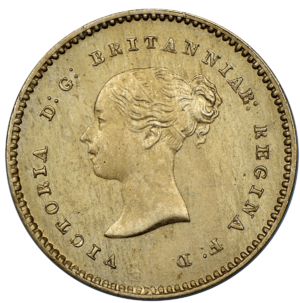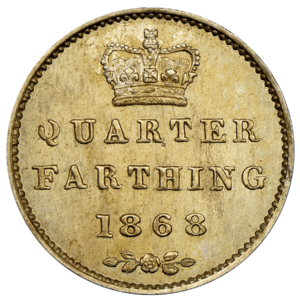Quarter farthing facts for kids
| United Kingdom | |
| Value | £0.000260416 0.0625d |
|---|---|
| Mass | 1.2 g |
| Diameter | 13.5 mm |
| Edge | Plain |
| Composition | (1839–1853) copper (1868) bronze |
| Years of minting | 1839, 1851–1853, 1868 |
| Obverse | |
 |
|
| Design | Queen Victoria |
| Designer | William Wyon |
| Design date | 1839 |
| Reverse | |
 |
|
| Design | Crown and rose |
| Design date | 1839 |
The quarter farthing was a very small coin from Britain. It was worth a tiny part of a pound, which is the main money in the United Kingdom. To give you an idea, it was only 1/16th of a penny!
The Royal Mint, which is where coins are made in the UK, created these coins. They were made from copper. However, these coins were not used in Britain itself. Instead, they were made especially for use in a place called British Ceylon. Today, British Ceylon is known as Sri Lanka.
Contents
The Quarter Farthing Coin
What Was This Coin?
The quarter farthing was a very small value coin. It was worth 1/3840th of a British pound. Imagine dividing a pound into 3,840 tiny pieces; one of those pieces would be a quarter farthing! It was also 1/192nd of a shilling.
These coins were made in several years: 1839, 1851, 1852, and 1853. They were mainly used for everyday buying and selling in British Ceylon. Later, in 1868, the Royal Mint also made some special versions of the coin called proofs. These proofs were made from bronze and were not meant to be used by the public. They were more like collector's items.
How the Coin Looked
The quarter farthing had two sides, just like coins today. These sides are called the obverse and the reverse.
The Front (Obverse)
The front of the coin showed a picture of Queen Victoria. She was facing to the left. This design was created by a famous artist named William Wyon. Around Queen Victoria's portrait, there were words in Latin: VICTORIA D: G: BRITANNIAR: REGINA F: D:. This means "Victoria, by the Grace of God, Queen of the Britains, Defender of the Faith."
The Back (Reverse)
The back of the coin also had a design by William Wyon. It featured a royal crown at the top. Below the crown, you could read the words QUARTER FARTHING and the year the coin was made. Underneath the date, there was a heraldic rose. This rose is a special symbol often used in British history, and it had three leaves on each side.
Coin Details
The quarter farthing coins made for use were made of copper. Each coin weighed about 1.2 grams. They were also quite small, with a diameter of 13.5 millimeters. This is about the size of a small button.
In 1868, the Royal Mint made those special proof coins. These were made from bronze and also from a mix of copper and nickel. However, none of these 1868 coins were ever put into circulation for people to use.
Where Was It Used?
Even though the quarter farthing was a British coin, it was never officially "legal tender" in the United Kingdom. This means you couldn't use it to buy things in Britain.
However, it was a fraction of the British farthing, which was used as money in Ceylon. Because of this, the quarter farthing has always been considered and listed as a British coin in coin collections and catalogs.

